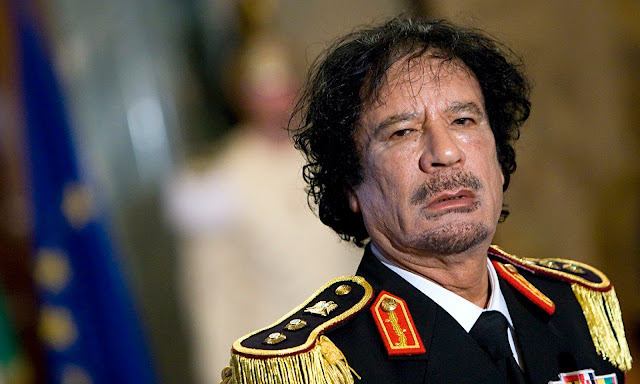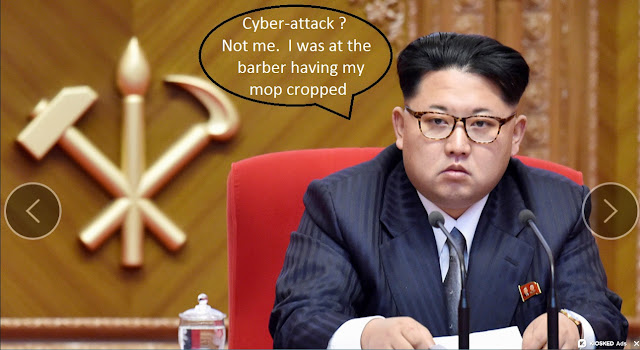All things considered, this
millennium is proving to be something of a sticky wicket for those
impatient visionaries who seized power, legally or not, to make a gilded
career for themselves as a high and mighty despot to bring new order to a
nation of quarrelsome ingrates. In the 20th century it could be pretty
much taken for granted that once the necessary collaborators had been sought, bribes
paid, arms shipped, governments suspended, trade hijacked, bank accounts
re-routed and emergency laws enacted, that the token civil unrest would quickly
die down so that international corporations could safely beat a path to the
door to pay homage to and do business with The New Management. Alas now
in the 21st century, even those who spent decades seeding family and
friends into the government and military to consolidate their personal
power can be surprised to find it suddenly slipping away like sand through
their fingers.
 |
| 9 April 2003: statue of Saddam Hussein falls in Firdos Square, Baghdad |
A-list despots who recently jumped or were pushed (to media fanfare at least) include
Iraq's Saddam Hussein, Libya's Col. Gaddafi and Egypt's President Mubarak. Meanwhile in Africa, the land of the Tin-Pot Despot, since year
2000 they said "Thanks but no thanks" to two handfulls of B-listers
including Eyadema (Togo), Rene (Seychelles), Moi (Kenya), Hayedalla
(Mauritania), Ben Ali (Tunisia), Kabila (Congo-Kinshasa), Taylor (Liberia),
Bozize (Central African Republic), Sata (Zambia), etc, etc. All in all
one could be forgiven for thinking that the ceaselessly beaten, raped,
tortured, imprisoned and murdered indigents were not at all happy with the
kindness and benevolence bestowed by their loving masters.
 |
| Oct 2011: Col. Gaddafi captured and killed at the Battle of Sirte |
 |
| "I did not have three thousand pairs of shoes, I had one thousand and sixty." - Imelda Marcos. Her excess spawned the word 'Imeldific'. |
However, unique in all these is North Korea's home grown Kim dynasty; Kim Il-Sung, Kim Jong-Il and today's Kim Jong-Un. Incredible as it may seem, the personality cult promoted by this succession has eclipsed all others before it, including even the Grand Masters Stalin and Mao Zedong. Kim Il-Sung began by granting himself the modest title of 'Great Leader' as early as 1949. By the time Kim Jong-Il was moving onto centre stage, the title had been upgraded to 'Supreme Leader'. One can only assume that during the career of the present Kim Jong-Un, there will be another promotion to 'Super Supreme Leader', by which time Pizza Hut will need to think long and hard if it has any intent of ever doing business in North Korea.
 |
| Before: Kim Il-Sung - alone and austere |
 |
| After: much happier, Kim Il-Sung with Kim Jong-Il, keeping it in the family |
The wider world does not know everything about life in North Korea, but to outside observers the Kims certainly appear to have hog-tied the country with key ideologies that have outlived the times. Since the 1950's Kim Il-Sung's policy of 'Juche' (essentially 'self-reliance') and later Kim Jong-Il's policy of 'Songun' (military first) have pervaded, shaped and controlled every aspect of education, economics and politics. When combined with the Cult of Kim, these ideologies have essentially become a religion but without the usual spiritual elements. While similar policies may have been trendy in the cold war climate of the 1950's, by 1978 even the ascendant Deng Xioaping (and by 1989 even the descendant Mr Gorbachev) could see that "The times they are a changing". In fact in the modern era the irrelevance of old doctrines, the determination to punish dissent with death and a blind refusal to even consider the evidence for ideas which challenge ideology is probably only rivaled by one other famously monolithic institution; the Catholic church.
So how should the Kim dynasty maintain it's longevity, given that despots are dropping like flies the world over, given that even countries like Iran are reigning in their nuclear ambitions and given that North Korea spectacularly underperforms in virtually everything compared with its southern neighbour (except possibly in the production of beer and methamphetamine) ? Just how is a young and thrusting despot supposed to earn the title of 'Super Supreme Leader' these days ? Well this is the evidence so far of the legacy which may come to define the new leadership.
1) Set the trend, don't follow the curve
 |
| Haircut 100 with Nick Heyward |
 |
| Haircut 101 with Kim Jong-Un |
This promotional offer in a barber's window in west London did not find favour with embassy officials. Attempts to intimidate the owner into removing the poster instantly transformed this local high street prank into global news.
http://www.theguardian.com/world/2014/apr/15/north-koreans-complain-london-hairdresser-kim-jong-un
2) Give them what they want, what they really, really want ... celebrity of course
South Korea's K-Pop industry makes it world leader in churning out fresh flesh. Giggly girl groups and moody blue boy bands are launched not just monthly but often quite literally weekly. Talent less it may be, relentless certainly but at the same time it's a huge money-spinner - just what every cash-strapped dictator needs to fund a nuclear arsenal. No surprise then that Moranbong, the DPRK's most popular girl group has been heavily lauded at the very highest level.
 |
| Moranbong - North Korea's home grown experiment with K-Pop |
Keen observers are waiting patiently to see if the next home grown clone will be a Psy from the Democratic People's Party.
3) Pinch with pride
Secret agents, spyplanes, drones ? Old news these days. Cyber attacks are now The New Black. Essentially it is an international competition to hide in plain sight, take what you want without anyone knowing it is missing and of course to leave no traces behind. Attacks are notoriously hard to pinpoint but more frequently the trail of crumbs leads back to a very hungry mouse in North Korea.
http://www.ibtimes.co.uk/north-korea-behind-81m-bangladesh-bank-cyber-heist-1559949
 |
| Protests of innocence have been less than convincing |
Ultimately we shall have to wait and see.
It could be all of these or far, far worse !











